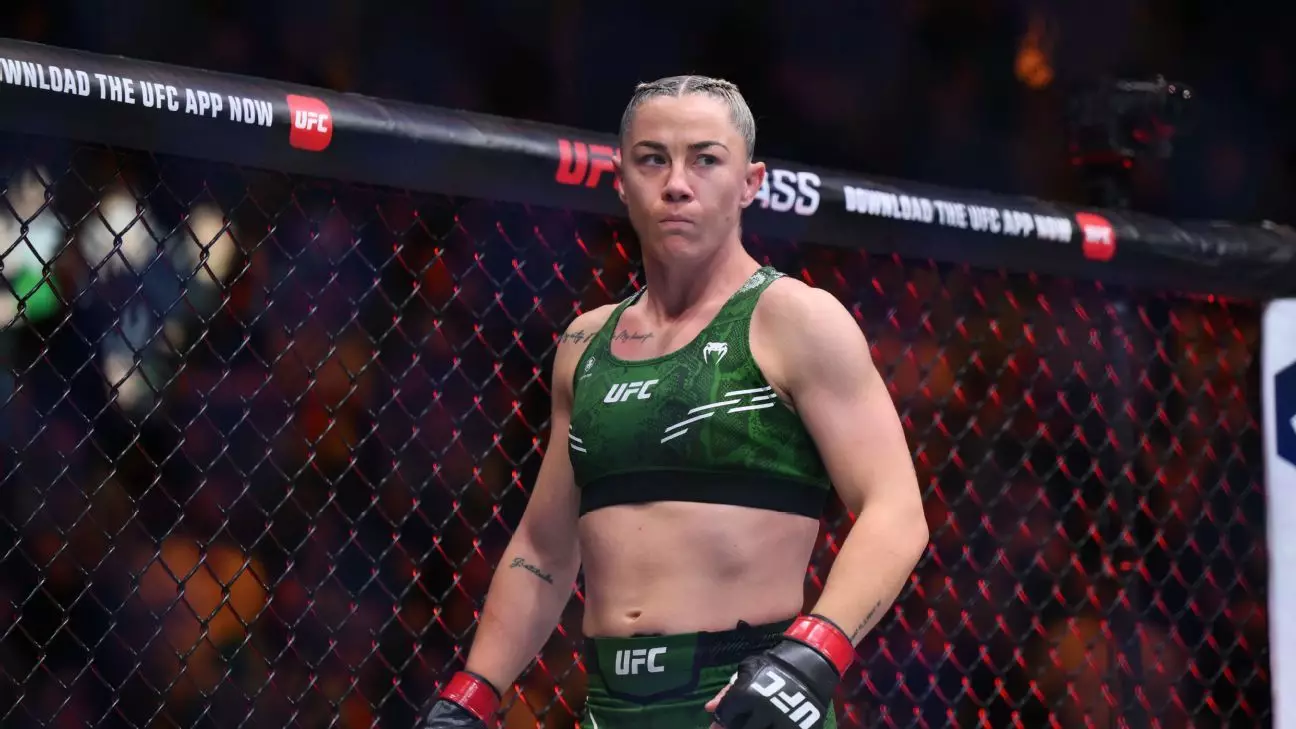Last July, during what was meant to be a showcase of her skills, Molly McCann faced a devastating turn of events in the Octagon against Bruna Brasil. McCann’s situation went south within minutes as she incurred a broken leg and endured punishing strikes to her body. These injuries left her fighting a monstrous uphill battle that would retreat even the most seasoned fighters into retreat. Ironically, even amid this dire situation, McCann remained resolute. She clung to the notion that victory was still possible despite battling with just one functional leg. However, it became clear that the match was slipping away, ending in a unanimous decision loss that weighed heavily on her spirit.
McCann’s reaction to this defeat is not just about loss; it reveals layers of emotion and complexity that athletes often grapple with. Most fighters have toughed it out in the face of adversity, but few can relate to the depths of despair this particular experience evoked. “This was the fight that hit me hardest,” she recounted in an interview with ESPN, emphasizing how the scale of her injury redefined her fight experience. The mental anguish lingered long after the final bell rang, painting a portrait of a fighter grappling with defeat and personal inadequacy.
The Psychological Toll of Injury
The aftermath of McCann’s injury was marked by a harsh reality: the inability to train and the gnawing feelings of embarrassment mingled with shame. She described it as a journey through “lonely days and weeks,” which speaks to the psychological trials that accompany physical injuries in sports. For a period, simply walking into the gym felt like a monumental task, as McCann had to confront not only her physical limitations but also the pressures of expectation. “You’ve just got to deal with the shame and embarrassment,” she expressed, showcasing that even elite athletes are not immune to the fortress of their own mind.
But this narrative is not one of mere despair; it is a testament to resilience. Athletes are often expected to bounce back immediately, yet the reality is that recovery—both physical and mental—is an arduous path. The meticulous grind of training that McCann underwent to prepare for her bouts means that each setback can feel like a harsh sentence. Recovery doesn’t just involve healing; it encompasses dealing with a sense of identity that can become intertwined with that of being an athlete.
A Vicious Cycle of Pain and Passion
Interestingly, McCann’s return to the gym was catalyzed by a revelation: her passion for her sport transcended the pain. “I really miss this,” she said, indicating that despite the harrowing experience, there is an insatiable longing for the fight. For McCann, training embodies a unique thrill, demonstrating the intricate relationship between pain and the pursuit of greatness. In combat sports, this balance of joy and suffering is almost romanticized; it draws fighters in, promising the highs that triumph brings, even after experiencing the lows of defeat.
As her fight against Alexia Thainara approaches, McCann’s path has illuminated a fundamental truth: the fight does not merely take place in the Octagon. It happens internally, with each athlete battling personal demons just as fiercely as they combat their physical opponents. McCann emphasizes, “Tiredness makes cowards of us all,” revealing an honesty about the struggle that resonates with countless individuals—athletes or not. Battling the elements, the body’s limitations, and societal expectations creates a crucible of growth that forces fighters to evolve.
The Roar of the Crowd and Companionship of Fighters
Now slated to make her return at London’s O2 Arena, McCann’s presence is anticipated not merely for her performance but for the electric atmosphere she cultivates. As a fighter, she understands the gravitational pull of her fellow competitors and the rabid fanbase that supports her, notably mentioning Paddy Pimblett and the communal spirit that envelops them. The raw energy of this camaraderie adds another layer to her narrative: triumphs are not just individual victories but are celebrated collectively within a vibrant community.
McCann is fully aware that while opinions on her fighting style may vary, the palpable excitement that surrounds her reinforces her value as a vital player in the sport. When she sets foot in the Octagon, she transforms it; the atmosphere shifts, and for that moment, nothing else matters. The dance between fighting and entertaining goes hand-in-hand, and it’s this duality that keeps her drawn back into the sport she loves, igniting a determined fire within.
In the end, Molly McCann embodies resilience, and while injuries may threaten to derail progress, they also serve to illuminate the fighter’s path. It is a journey marked by not only the battles in the Octagon but also those fought within—a testament to the unbreakable spirit of a true warrior.


Leave a Reply